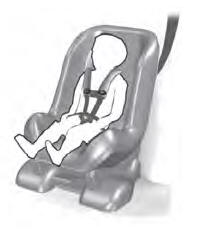Lincoln Aviator: Seatbelt Systems / Removal and Installation - Seatbelt Shoulder Height Adjuster
Removal
NOTE: Removal steps in this procedure may contain installation details.
NOTE: Driver side shown, passenger side similar.
-
Remove the upper B-pillar trim panel.
Refer to: B-Pillar Trim Panel (501-05 Interior Trim and Ornamentation, Removal and Installation).
-
Remove the D-ring bolt and position the front seatbelt aside.
Torque: 30 lb.ft (40 Nm)
.jpg) |
-
NOTE: This step is only necessary when installing a new component.
NOTE: The spacer is part of the seatbelt shoulder height adjuster.
Remove and discard the spacer from the front seatbelt retractor and pretensioner D-ring bolt.
.jpg) |
-
Position the seatbelt shoulder height adjuster.
-
Remove the bolt.
Torque: 30 lb.ft (40 Nm)
-
NOTE: For passenger side, rotate the height adjuster 90 degrees counter-clockwise.
Rotate the height adjuster 90 degrees clockwise.
-
Remove the bolt.
.jpg) |
-
Remove the seatbelt shoulder height adjuster.
.jpg) |
Installation
NOTE: During installation, make sure the seatbelt webbing is not twisted and the seatbelts and buckles are accessible to the occupants.
-
To install, reverse the removal procedure.
-
Check the seatbelt system for correct operation.
Refer to: Seatbelt Systems (501-20A Seatbelt Systems, Diagnosis and Testing).
 Removal and Installation - Front Seatbelt Retractor and Pretensioner
Removal and Installation - Front Seatbelt Retractor and Pretensioner
Removal
WARNING:
The following procedure prescribes critical repair steps
required for correct restraint system operation during a crash. Follow
all notes and steps carefully...
 Removal and Installation - Second Row Center Seatbelt Buckle
Removal and Installation - Second Row Center Seatbelt Buckle
Removal
NOTE:
Removal steps in this procedure may contain installation details.
Remove the second row center seat.
Refer to: Second Row Center Seat (501-10B Second Row Seats, Removal and Installation)...
Other information:
Lincoln Aviator 2020-2025 Owners Manual: Rear View Camera
WARNING: The rear view camera system is a reverse aid supplement device that still requires the driver to use it in conjunction with the interior and exterior mirrors for maximum coverage. WARNING: Objects that are close to either corner of the bumper or under the bumper, might not be seen on the screen due to the limited coverage of the camera system...
Lincoln Aviator 2020-2025 Service Manual: General Procedures - Connecting Rod Bearing Journal Clearance
Check NOTE: Refer to the appropriate Section 303-01 for the specification. NOTE: The crankshaft connecting rod journals must be within specifications to check the connecting rod bearing journal clearance. Remove the connecting rod bearing cap and connecting rod bearing...
Categories
- Manuals Home
- Lincoln Aviator Owners Manual
- Lincoln Aviator Service Manual
- Resetting the System
- Interior Lamps
- Drive Modes
- New on site
- Most important about car
Child Seats

Use a child restraint (sometimes called an infant carrier, convertible seat, or toddler seat) for infants, toddlers and children weighing 40 lb (18 kg) or less (generally four-years-old or younger).
Using Lap and Shoulder Belts
WARNING: Do not place a rearward facing child restraint in front of an active airbag. Failure to follow this instruction could result in personal injury or death.
